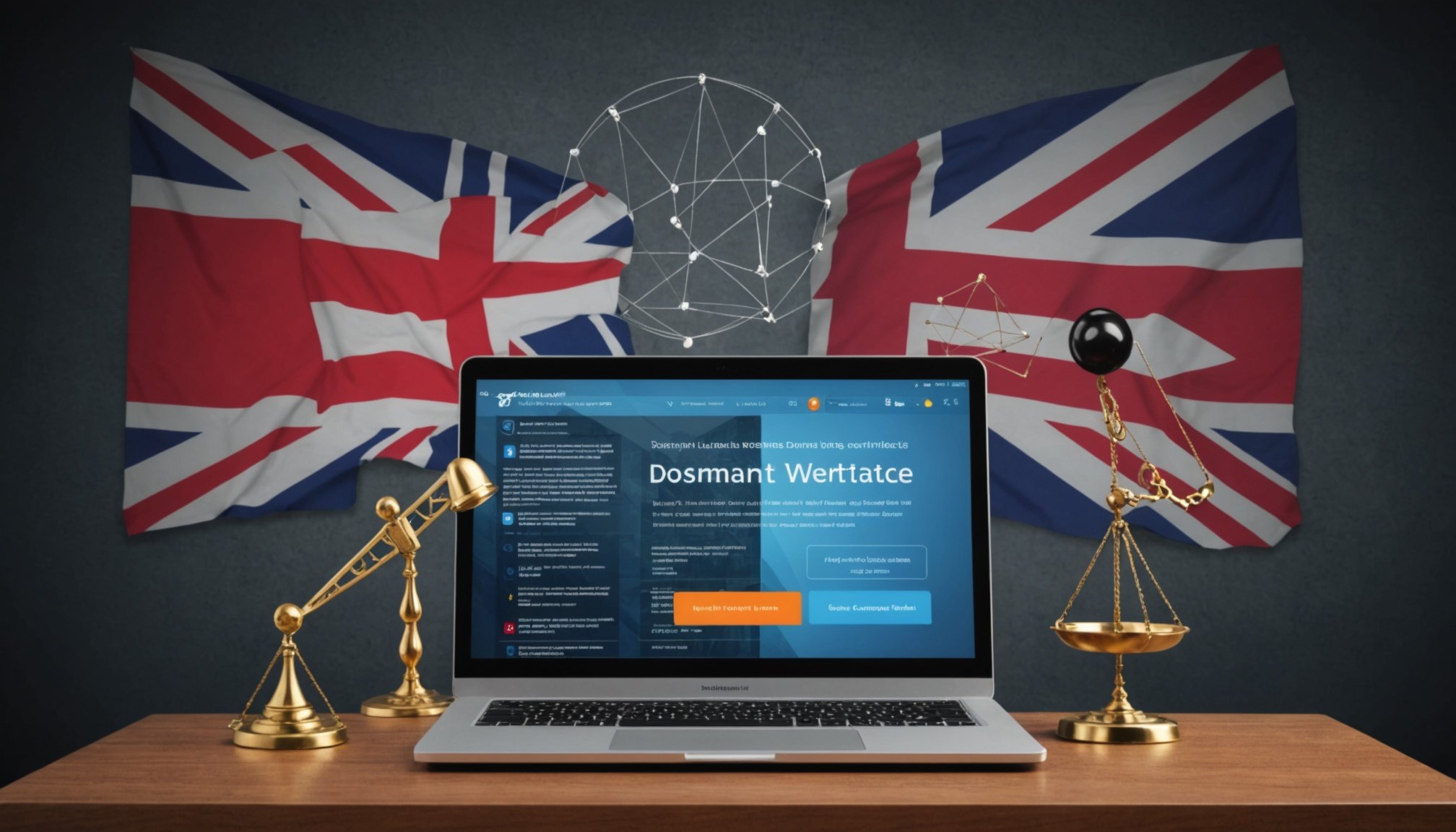Mastering Domain Name Conflicts: Your Essential Legal Handbook for UK Enterprises
Understanding the Importance of Domain Names for Your Business
In the digital age, a domain name is more than just an address for your website; it is a crucial part of your brand identity and online presence. For UK enterprises, securing the right domain name can be a significant step in establishing a strong online footprint. However, with the increasing demand for domain names, conflicts and disputes are becoming more common.
Why Domain Names Matter
- Brand Identity: Your domain name is often the first point of contact between your business and potential customers. It should reflect your brand and be easy to remember.
- Customer Trust: A professional domain name can enhance customer trust and credibility. For example, a domain name like
yourbusiness.co.uklooks more legitimate than a free subdomain likeyourbusiness.blogspot.com. - SEO Benefits: Having a relevant and concise domain name can also improve your search engine rankings, making it easier for customers to find your website.
Choosing the Right Domain Name
Selecting the right domain name is a critical decision that can impact your business’s long-term success. Here are some tips to help you make the right choice:
Also to discover : Ultimate handbook for pci dss compliance in the uk: navigating legal obligations for secure payment card transactions
Tips for Choosing a Domain Name
- Keep it Simple: Choose a domain name that is easy to spell and remember.
- Be Relevant: Ensure the domain name is relevant to your business and services.
- Avoid Confusion: Avoid domain names that are too similar to existing brands or trademarks.
- Check Availability: Use domain name search tools to check the availability of your desired domain name across different extensions (e.g., .co.uk, .com, .org).
Domain Extensions
Different domain extensions serve different purposes and can target specific audiences. Here is a brief overview of some common domain extensions:
| Domain Extension | Purpose |
|---|---|
| .co.uk | UK businesses |
| .com | Global businesses |
| .org | Non-profit organizations |
| .net | Network-related services |
| .io | Tech and startup companies |
Registering Your Domain Name
Once you have chosen your domain name, the next step is to register it through a domain registrar. Here’s what you need to know:
Also read : Ultimate handbook for legally managing employee relocation from the uk to international locations
How to Register a Domain Name
- Choose a Registrar: Select a reputable domain registrar like GoDaddy, Namecheap, or 123-reg.
- Check for Availability: Ensure the domain name is available for registration.
- Complete the Registration: Fill out the registration form with accurate information, including your name, address, and contact details.
- Set Up DNS Settings: Configure your DNS settings to point to your web hosting service.
DNS Settings Explained
DNS (Domain Name System) settings are crucial for directing traffic to your website. Here’s a simplified explanation:
- DNS Records: These are the instructions that tell the internet where to find your website. Common DNS records include A records (IP address), MX records (email), and CNAME records (alias).
- DNS Propagation: After changing DNS settings, it may take some time (usually 24-48 hours) for the changes to propagate globally.
Protecting Your Domain Name
Protecting your domain name is essential to prevent unauthorized use and potential disputes.
Intellectual Property Considerations
- Trademark Protection: Ensure your domain name does not infringe on existing trademarks. Conduct a thorough search before registering your domain name.
- Domain Name Monitoring: Regularly monitor for similar domain names that could be used to confuse your customers.
Common Domain Name Disputes
- Cybersquatting: This involves registering a domain name in bad faith, often to sell it back to the trademark owner at an inflated price.
- Typosquatting: Registering domain names that are slight misspellings of popular domain names to capture typo traffic.
Dispute Resolution
If you find yourself in a domain name dispute, there are several steps and mechanisms you can use to resolve the issue.
Understanding Dispute Resolution Processes
- UDRP (Uniform Domain-Name Dispute-Resolution Policy): This is a process managed by ICANN (Internet Corporation for Assigned Names and Numbers) that allows trademark holders to dispute domain name registrations.
- Nominet Dispute Resolution Service: For .uk domain names, Nominet offers a dispute resolution service that can help resolve conflicts.
Steps to Resolve a Domain Name Dispute
- Gather Evidence: Collect evidence that proves your rights to the domain name, such as trademark registrations and business records.
- File a Complaint: Submit your complaint to the relevant dispute resolution body, providing all necessary documentation.
- Negotiate a Settlement: If possible, try to negotiate a settlement with the other party before proceeding to a formal hearing.
Practical Advice and Support
Navigating domain name conflicts can be complex, but with the right support and advice, you can protect your business’s online presence.
Legal Support
- Consult a Lawyer: If you are involved in a domain name dispute, it is advisable to consult with a lawyer specializing in intellectual property and domain name law.
- Use Online Resources: Websites like the World Intellectual Property Organization (WIPO) and Nominet provide valuable resources and guides on domain name disputes.
Financial Considerations
- Budget for Legal Fees: Dispute resolution can be costly, so it’s important to budget for legal fees.
- Consider Mediation: Mediation can be a cost-effective and time-efficient way to resolve disputes without going to court.
Case Studies and Examples
Understanding real-world examples can help illustrate the importance of mastering domain name conflicts.
Example: The Case of “Apple Corps vs. Apple Inc.”
In the early 2000s, Apple Corps, the Beatles’ record label, and Apple Inc. were involved in a long-standing dispute over the use of the “Apple” name. This case highlights the complexity of trademark and domain name disputes, especially when dealing with well-known brands.
Long-Term Strategies for Domain Name Management
Effective domain name management is not a one-time task but an ongoing process.
Book Keeping and Record Management
- Keep Accurate Records: Maintain accurate and up-to-date records of your domain registrations, DNS settings, and any changes made.
- Regularly Review: Periodically review your domain portfolio to ensure all domains are still relevant and not at risk of expiration.
Customer Support and Communication
- Inform Your Customers: If you need to change your domain name, inform your customers well in advance to avoid confusion.
- Provide Clear Information: Ensure your website and marketing materials clearly display your domain name and any changes.
Mastering domain name conflicts is crucial for any UK enterprise aiming to establish and maintain a strong online presence. By understanding the importance of domain names, choosing the right domain, registering it correctly, protecting it, and knowing how to resolve disputes, you can safeguard your business’s online identity.
Final Tips
- Stay Informed: Keep up-to-date with the latest developments in domain name law and best practices.
- Seek Professional Help: Do not hesitate to seek legal and technical support when needed.
- Plan Ahead: Long-term planning and regular monitoring can help prevent many domain name conflicts.
By following these guidelines and staying vigilant, you can protect your domain name and ensure your business continues to thrive online.
Table: Comparing Domain Registration and Dispute Resolution Services
| Service | Description | Cost | Time Frame |
|---|---|---|---|
| Domain Registration | Registering a domain name through a registrar like GoDaddy or Namecheap. | £5-£20/year | Immediate |
| UDRP | Uniform Domain-Name Dispute-Resolution Policy managed by ICANN. | $1,500-$3,000 | 60-90 days |
| Nominet DRS | Dispute resolution service for .uk domain names. | £200-£750 | 30-60 days |
| Legal Consultation | Consulting with a lawyer specializing in domain name law. | £100-£500/hour | Varies |
| Mediation | Mediation services to resolve disputes without going to court. | £500-£2,000 | 1-3 months |
Quotes from Experts
- “Domain names are the real estate of the internet. Protecting them is as important as protecting your physical business location.” – John Smith, Intellectual Property Lawyer.
- “A well-chosen domain name can significantly boost your online presence and customer trust. It’s an investment worth making.” – Jane Doe, Digital Marketing Specialist.
- “Dispute resolution processes can be complex and time-consuming. It’s crucial to have the right legal support to navigate these issues effectively.” – Michael Johnson, Domain Name Dispute Resolution Expert.
By mastering the art of domain name management and dispute resolution, you can ensure your business’s online presence remains strong and secure, helping you to build a loyal customer base and drive long-term success.











